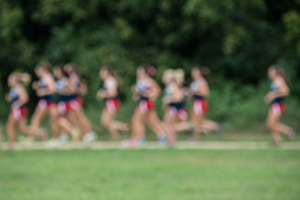
This June marked the 50th anniversary of the passage of the landmark Title IX law, which recognized gender equity in education as a civil right.
No person in the United States shall, on the basis of sex, be excluded from participation in, be denied the benefits of, or be subjected to discrimination under any education program or activity receiving Federal financial assistance. [1972]
Congress passed these words, offered as an amendment to the Higher Education Act, with broad public support, and President Richard Nixon signed the measure into law on June 23, 1972, with relatively little fanfare. However, the public discourse over enforcement
and what constitutes discrimination on the basis of sex became—and continues to be—more controversial. Particularly as the interpretations of discrimination on the basis of sex evolved and expanded over the years to include equal opportunity
in athletics, sexual harassment and assault on campus, pregnancy, and sexual orientation and gender identity.
Most recently, the Biden administration unveiled new draft Title IX rules this summer that include plans to codify safeguards for LGBTQIA+ students and
restore and strengthen protections for students who are victims of sexual harassment and assault. While most colleges and universities already cover sexual orientation and gender identity in their nondiscrimination policies, the proposed policy
change would offer LGBTQ+ students more robust protections and allow them to file federal complaints against their institutions for failing to uphold their rights. AACRAO is a longtime proponent of inclusivity around gender expression and supports
the expansion of rights and protections under Title IX.
However, it is still unclear how the rule would apply to athletics, a key point of contention as eighteen states across the country have moved to ban transgender students from participation in women's and girls' sports. Additionally, a group of 15
state attorneys general urged the Biden administration in April to reconsider its interpretation of Title IX.
Tomorrow, join AACRAO’s Women’s and LGBTQIA+ Caucuses for a webinar for a discussion on Title IX’s legacy, an overview of the new draft rules and their potential impact on campuses, and the intersection of the Supreme Court’s recent Dobbs v. Jackson Women's Health Organization decision and state rights.